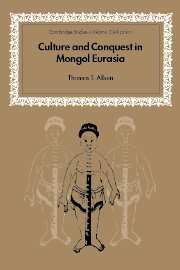Book contents
- Frontmatter
- Contents
- Preface
- Note on transliteration
- Abbreviations
- PART I BACKGROUND
- PART II POLITICAL–ECONOMIC RELATIONS
- PART III INTERMEDIARIES
- 9 Marco Polo and Po-lo
- 10 Qubilai and Bolad Aqa
- 11 Rashīd al-Dīn and Pūlād chīnksānk
- PART IV CULTURAL EXCHANGE
- PART V ANALYSIS AND CONCLUSIONS
- Bibliography
- Index
- Other titles in the series
9 - Marco Polo and Po-lo
Published online by Cambridge University Press: 04 September 2009
- Frontmatter
- Contents
- Preface
- Note on transliteration
- Abbreviations
- PART I BACKGROUND
- PART II POLITICAL–ECONOMIC RELATIONS
- PART III INTERMEDIARIES
- 9 Marco Polo and Po-lo
- 10 Qubilai and Bolad Aqa
- 11 Rashīd al-Dīn and Pūlād chīnksānk
- PART IV CULTURAL EXCHANGE
- PART V ANALYSIS AND CONCLUSIONS
- Bibliography
- Index
- Other titles in the series
Summary
The study of cultural contact and exchange is intimately connected to the question of agency. Culture, of course, can be transmitted by a number of mechanisms – commodities, ideologies, literary works – as well as people. Material culture, transported as trade, tribute, or booty, can diffuse artistic motifs and technology over great distances. Texts, particularly religious texts, also convey culture over time and space and most particularly between large-scale, urban-based civilizations. The extensive corpus of Chinese translations of the Indian Buddhist canon well illustrates this phenomenon. In the Mongolian era, the fourth mechanism, direct human agency, assumed, as already argued, a very special importance in East–West cultural communication. Given the Mongols' penchant for moving imperial personnel, subject peoples, and specialists from one cultural zone of the empire to another, there were innumerable face-to-face encounters between individuals and communities of the most diverse ethnic, linguistic, and religious backgrounds. In this part of the study, we will investigate the major “brokers” in medieval Eurasian cultural history.
By far the most famous of these intermediaries is Marco Polo. As is well known, from his own day to the present, his travels have been the center of controversy; indeed, many deny that the Venetian ever set foot in China.
- Type
- Chapter
- Information
- Culture and Conquest in Mongol Eurasia , pp. 59 - 62Publisher: Cambridge University PressPrint publication year: 2001



